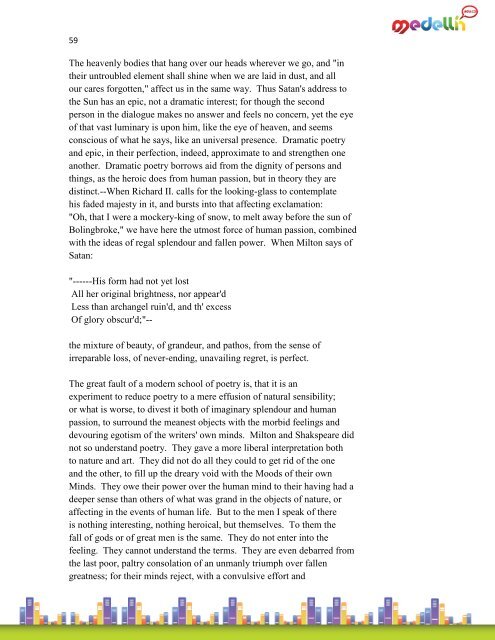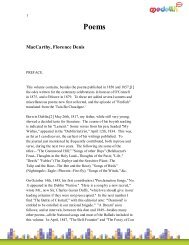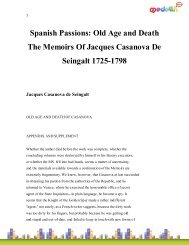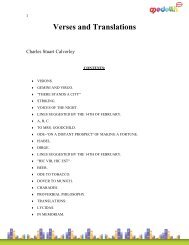Lectures On The English Poets William Hazlitt
Lectures On The English Poets William Hazlitt
Lectures On The English Poets William Hazlitt
You also want an ePaper? Increase the reach of your titles
YUMPU automatically turns print PDFs into web optimized ePapers that Google loves.
59<br />
<strong>The</strong> heavenly bodies that hang over our heads wherever we go, and "in<br />
their untroubled element shall shine when we are laid in dust, and all<br />
our cares forgotten," affect us in the same way. Thus Satan's address to<br />
the Sun has an epic, not a dramatic interest; for though the second<br />
person in the dialogue makes no answer and feels no concern, yet the eye<br />
of that vast luminary is upon him, like the eye of heaven, and seems<br />
conscious of what he says, like an universal presence. Dramatic poetry<br />
and epic, in their perfection, indeed, approximate to and strengthen one<br />
another. Dramatic poetry borrows aid from the dignity of persons and<br />
things, as the heroic does from human passion, but in theory they are<br />
distinct.--When Richard II. calls for the looking-glass to contemplate<br />
his faded majesty in it, and bursts into that affecting exclamation:<br />
"Oh, that I were a mockery-king of snow, to melt away before the sun of<br />
Bolingbroke," we have here the utmost force of human passion, combined<br />
with the ideas of regal splendour and fallen power. When Milton says of<br />
Satan:<br />
"------His form had not yet lost<br />
All her original brightness, nor appear'd<br />
Less than archangel ruin'd, and th' excess<br />
Of glory obscur'd;"--<br />
the mixture of beauty, of grandeur, and pathos, from the sense of<br />
irreparable loss, of never-ending, unavailing regret, is perfect.<br />
<strong>The</strong> great fault of a modern school of poetry is, that it is an<br />
experiment to reduce poetry to a mere effusion of natural sensibility;<br />
or what is worse, to divest it both of imaginary splendour and human<br />
passion, to surround the meanest objects with the morbid feelings and<br />
devouring egotism of the writers' own minds. Milton and Shakspeare did<br />
not so understand poetry. <strong>The</strong>y gave a more liberal interpretation both<br />
to nature and art. <strong>The</strong>y did not do all they could to get rid of the one<br />
and the other, to fill up the dreary void with the Moods of their own<br />
Minds. <strong>The</strong>y owe their power over the human mind to their having had a<br />
deeper sense than others of what was grand in the objects of nature, or<br />
affecting in the events of human life. But to the men I speak of there<br />
is nothing interesting, nothing heroical, but themselves. To them the<br />
fall of gods or of great men is the same. <strong>The</strong>y do not enter into the<br />
feeling. <strong>The</strong>y cannot understand the terms. <strong>The</strong>y are even debarred from<br />
the last poor, paltry consolation of an unmanly triumph over fallen<br />
greatness; for their minds reject, with a convulsive effort and

















